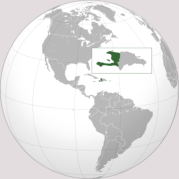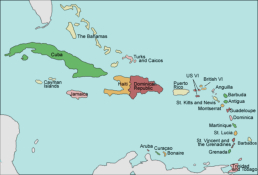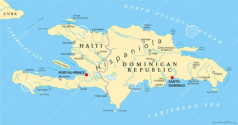


Haiti is a country on the island of Hispaniola in the Greater Antilles archipelago of the Caribbean.
It occupies the smaller western three-eighths of the island which it shares with the Dominican Republic. Haiti is 27,750 square kilometres (10,714 sq mi) in size and has an estimated 9.9 million people, about a million of whom live in the capital city of Port-au-Prince.
Explored by Columbus in 1492, Haiti's native Arawaks fell victim to Spanish rule. In 1697, Haiti became the French colony of Saint-Dominique, which became a leading sugarcane producer dependant on slaves. In 1791, an insurrection erupted among the slave population of 480,000, resulting in a declaration of independence be Pierre-Dominique Toussaint l'Ouverture in 1801. Napoleon Bonaparte suppressed the independence movement, but it eventually triumphed in 1804 under Jean-Jacques Dessalines, who gave the new nation the Arawak name Haiti. It was the world's first independent black republic.
The revolution wrecked Haiti's economy. A succession of dictatorships continued to hurt the nation's development and in 1905, a bankrupt Haiti accepted a US customs receivership until 1941. Occupation be US marines from 1915 to 1934 brought measure of stability. Haiti's high population growth made it the most densely populated nation in the Western Hemisphere, as well as the poorest.
After the flight of the dictator 'Baby Doc' Duvalier in 1986, the international community tried to establish democracy in Haiti. The country's first elected chief executive, Jean-Bertrand Aristide, a leftist Roman catholic priest who seemed to promise a new era in Haiti, took office in February 1991; the military, however, took control in a coup nine months later. A UN peacekeeping force, led by the US, arrived in 1994. Aristide was restored to office and Rene Preval became his successor in the 1996 elections. US soldiers and UN peacekeepers left in 2000; Haiti's government, however, remained ineffectual and its economy was in ruins. Haiti has the highest rates of AIDS, malnutrition, and infant mortality in the region.
In January 2010 a magnitude seven earthquake struck 10 miles southwest of Port-au-Prince levelling many sections of the city, destroying government buildings, foreign aid offices and countless slums. A disastrous cholera epidemic swiftly followed.
In october 2016 hurricain matthew hit southwest Haiti devastating homes, businesses, crops and leaving more than a thousand people dead.
Despite billions of dollars in aid, Haiti remains in economic and political chaos.